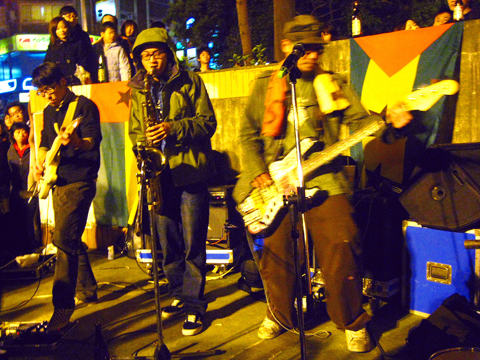Dub has been around since Osbourne “King Tubby” Ruddock and Lee “Scratch” Perry developed it in the late 1960s, but the sound is relatively new for Taiwan.
Taimaica Soundsystem — its name is a combination of Taiwan and Jamaica — wants to establish this Jamaican reggae/dub sound here. The band’s music is an organic hybrid of live sound with electronic manipulation. Membership has grown from three musicians to nine over the last couple of years.
“We like dub music and lots of other music genres — that’s why we have nine members,” Taimaica member Dahu Hu said in an interview on Tuesday. “We all have different music backgrounds and it’s good for us ’cause we like people to dance with our music.”

PHOTO COURTESY OF TAIMAICA SOUNDSYSTEM
The band has both electronic and live musicians, with founding members Allen Liu (劉培倫), aka DJ @llenblow, and Liu Ru-lin (劉儒霖) on bass and guitar respectively, Shorty Liu (劉力予), aka DJ Shorty, on dub control and sampling, guitar player Angus Chen (陳俊安), Dahu Hu (胡汶其) on synthesizer, and drummer Agoo Lwi (呂思緯). The horn section is John Du (杜則翰) on trumpet and saxophonist Jaco Cheng (張朝凱). The sole female artist and the band’s newest member, Bambam Lin (林以樂), plays the organ.
Dub has an emphasis on bass that the band adheres to. Hu said: “The song usually starts from bass, and when the bass line is clear, then we start to jam.” The beat must be manipulated to drive the rhythm, and Hu said that drummer Lwi is “a robot — he can maintain our BPM [beats per minute] in a certain speed so we can sync our DJ stuff and the laptop’s BPM.” The band also uses a lot of delay effect. The result is reggae-dub with elements of funk and drum ’n’ bass.
Taimaica appears tomorrow night at Underworld with danceable, soulful reggae artists High Tide and ska band Skaraoke; on May 24 at an outdoor benefit concert for Myanmar Cyclone Relief; and at the Peace Festival, Hoping for Hoping, in June.

In the March 9 edition of the Taipei Times a piece by Ninon Godefroy ran with the headine “The quiet, gentle rhythm of Taiwan.” It started with the line “Taiwan is a small, humble place. There is no Eiffel Tower, no pyramids — no singular attraction that draws the world’s attention.” I laughed out loud at that. This was out of no disrespect for the author or the piece, which made some interesting analogies and good points about how both Din Tai Fung’s and Taiwan Semiconductor Manufacturing Co’s (TSMC, 台積電) meticulous attention to detail and quality are not quite up to

April 21 to April 27 Hsieh Er’s (謝娥) political fortunes were rising fast after she got out of jail and joined the Chinese Nationalist Party (KMT) in December 1945. Not only did she hold key positions in various committees, she was elected the only woman on the Taipei City Council and headed to Nanjing in 1946 as the sole Taiwanese female representative to the National Constituent Assembly. With the support of first lady Soong May-ling (宋美齡), she started the Taipei Women’s Association and Taiwan Provincial Women’s Association, where she

Chinese Nationalist Party (KMT) Chairman Eric Chu (朱立倫) hatched a bold plan to charge forward and seize the initiative when he held a protest in front of the Taipei City Prosecutors’ Office. Though risky, because illegal, its success would help tackle at least six problems facing both himself and the KMT. What he did not see coming was Taipei Mayor Chiang Wan-an (將萬安) tripping him up out of the gate. In spite of Chu being the most consequential and successful KMT chairman since the early 2010s — arguably saving the party from financial ruin and restoring its electoral viability —

It is one of the more remarkable facts of Taiwan history that it was never occupied or claimed by any of the numerous kingdoms of southern China — Han or otherwise — that lay just across the water from it. None of their brilliant ministers ever discovered that Taiwan was a “core interest” of the state whose annexation was “inevitable.” As Paul Kua notes in an excellent monograph laying out how the Portuguese gave Taiwan the name “Formosa,” the first Europeans to express an interest in occupying Taiwan were the Spanish. Tonio Andrade in his seminal work, How Taiwan Became Chinese,